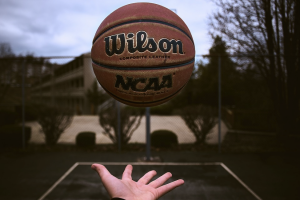
By Joe Baublitz, Staff Writer
A dark day in college sports, September 26th saw the FBI charge college coaches and Adidas shoe executives with corruption for bribing coaches and high school athletes. This “pay to play” scandal has fans facing a harsh reality that college sports may not be as innocent as they seem.
To many, college basketball represents the essence of competition. People are enamored by Cinderella stories, believing that if a small, regional school can compete alongside a larger university with a national recruiting pool, anything is possible. Whether it was 8th seed Villanova defeating Patrick Ewing’s top-ranked Georgetown in the 1985 championship game, or George Mason’s magical run to the Final Four in 2006, everyone wants to see David defeat Goliath.
Somewhere along the way, the Goliaths got greedy. Afraid of losing their Goliath status, corruption crept into college basketball. Coaches started yielding their power and do whatever it takes to win. To find corruption in college basketball, just follow the money.
In a three-year investigation, the “FBI probe focused on coaches being paid tens of thousands of dollars to steer NBA-bound players toward sports agents, financial advisers and apparel companies.”[1] Assistant coaches from Auburn, Arizona, Oklahoma State, and USC were allegedly taking money to send players to certain agents and advisors. These coaches now face charges of “bribery conspiracy, solicitation of bribes, honest services fraud conspiracy, honest services fraud, conspiracy to commit wire fraud, and Travel Act conspiracy.”[2] Such charges could bring up to 80 years in jail time, [3] a far cry from the slap-on-the-wrist punishment that the NCAA usually gives. Additionally, Adidas’s director of global marketing was charged with paying cash to families to bribe players into attending Adidas-sponsored schools.[4] Young high school athletes are being used as pawns so adults can get paid more money.
A local connection acted as the undercover agent in the investigation. Pittsburgh financial advisor, Marty Blazer, led the FBI to the coaches and executives caught up in the scandal. Blazer was a 1992 graduate of Carnegie Mellon University who was actively funneling money to college players in hopes that they would use his services when they reached the professional ranks.[5] The Manhattan US Attorney’s Office caught on and told Blazer that he could be charged. To avoid a harsh punishment, he led the FBI to the coaches and executives that were bribing players.[6] Throughout the next three years, he was the principal agent that helped the FBI gather the evidence needed to make the charges on Tuesday.
The coaches involved in the scandal were just assistant coaches, until one of the most prominent coaches in college basketball was implicated. Two-time NCAA Champion coach Rick Pitino has lead the Louisville Cardinals since 2002, and shockingly, he was likely involved in the scandal.[7] Winning over 400 games and one NCAA champion at Louisville, Pitino faces criticism that his entire coach tenure is a sham. The FBI’s investigation referred to a mysterious “Coach 2” as a central figure of the scandal.[8] The identity of “Coach 2” was initially unclear, but news got out that it was likely Rick Pitino. While there is currently no official confirmation, Pitino has lost his job over the scandal. On Wednesday, September 27th, Louisville “effectively fired” Pitino.[9] “Coach 2” funneled “$100,000 from an apparel company to secure a top recruit’s commitment.”[10] An undercover FBI agent recorded a conversation with one of the defendants, AAU director Johnathan Augustine, who claimed that “Coach 2” has tremendous pull within Adidas.[11]
Pitino is the biggest name in the scandal, but the scandal is far-reaching. Adidas, AAU directors, sports agents, and college coaches are all involved, and arrests have been made that could potentially put people in jail for up to 80 years. To get the high school players to play at Adidas programs, executives and coaches paid players or agents. Instead of paying to play, however, the defendants will soon be paying for their pay.
Sources